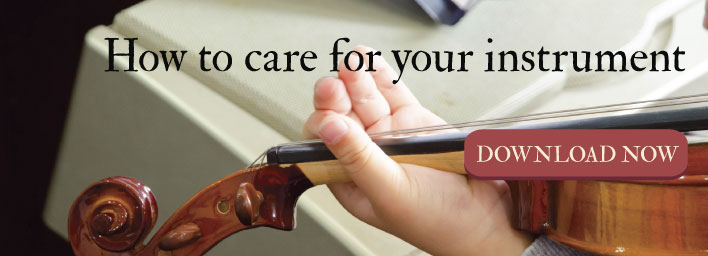How Often Should I Tune My Violin?

If you’re a beginner violinist, there are many things to learn. In addition to learning basic music theory, there are certain maintenance tasks that you must swiftly master to help keep your violin in top playing condition. And although many of those concentrate on instrument care, the one thing that you must learn immediately is how to tune your violin.
Since tuning an instrument isn’t always the most enjoyable task, naturally students want to know how often they should perform it. Indeed, one of the most frequently asked questions is "How often should I tune my violin?"However, the answer isn’t always the same for every player. Your violin is unique, and certain aspects like its age, the materials used when it was made, and the strings you have on it contribute to how often you’ll need to tune it.
General Tuning Rules
- You should check your violin for correct pitch each time you play it. It may not need tuned, but it probably will require it, so go ahead and get your chromatic tuner out before you start practice.
- At first, don’t rely on your own intonation, use an electronic tuner. Pitch pipes or tuning forks will work for you later when you have a better grasp of the correct pitch frequencies.
- If you are using an electronic tuner that sounds the pitch for you (as opposed to a read-out version like the Snark tuner), it will help if the pitch is continuous. The same rule applies to a tuning fork.
- Your stings are under a lot of pressure. Use small adjustments when tuning to prevent breakage (especially the E string) that could damage your violin or your person.
- Always try to bring the string to pitch by working from below it. In other words, it’s easier to gradually increase a flat (too low) string, than it is to bring down the pitch of a string that’s too sharp.
- If your string doesn’t register on your tuner at the correct pitch (e.g. you’re A string is reading B), use the tuning pegs to loosen it slowly, then use your fine tuners to make the final adjustments.
- Every time you tune one of the strings on your violin the others are effected, so be patient. It will take some time getting used to the particular behaviors of your instrument.
- New violin strings will stretch, so expect to tune them more frequently until they settle in.
When it’s Time to Tune
The more you play and practice, the easier it will be for you to hear when your violin needs to be tuned. As mentioned, you should check the pitch of each string every time you play. It’s simply part of being a musician. If you play every day and your strings are well settled, probably your violin will only need minor adjustments to the fine tuners to set it straight. However, if it’s been collecting dust for a few weeks or even months, be prepared to spend some time getting it back in tune.
Recognizing Problems
Student violinists rarely use real sheep gut strings on their instruments, so if your violin goes out of tune while you are playing, or you have to constantly correct large pitch differences, these can indicate other issues that needs attention. Perhaps your pegs need refitted, or you simply need to have the violin restrung. Both of these fixes are relatively inexpensive and can be performed by your local instrument dealer.
A word of caution: if you plan to attempt string replacement on your own, never, never, never remove all of your strings at once. Replace them one at a time. The tension created by the strings holds important pieces of your violin in place (like your soundpost and bridge), and removing all of the strings at once will cause those parts to shift.
You may also want to upgrade your stings from steel to a set of Perlon (a synthetic nylon) strings that are readily available and gaining in popularity. Thomastik-Infeld makes an excellent student set called Alphayue that sound full and rich, and provide splendid playability.
So the answer to the question of "How often should I tune my violin?" really depends on a number of factors. Your specific violin will determine how frequently you need to tune it, and the more you practice this particular skill, your own ability to distinguish pitch will improve.

